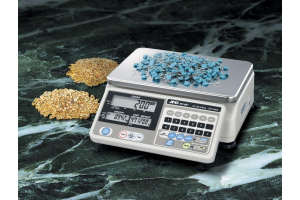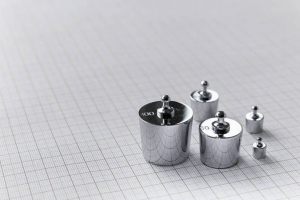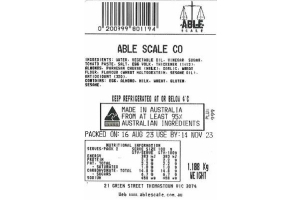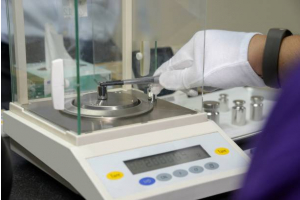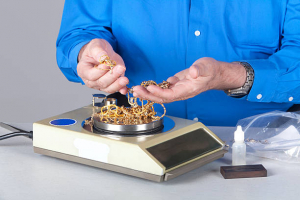
Medical scales — sometimes referred to as fitness scales or medical balance scales — have long been acknowledged as a pivotal aspect of health and fitness management. Scales for the fitness industry are designed to provide accurate measurements of an individual's weight, which plays a crucial role in monitoring and managing weight-related aspects.
Many athletes are advised to regularly assess their weight, following established guidelines for optimal body weight in relation to their sport and overall health, whereas patients dealing with heart failure are advised to use medical weights for consistent weight monitoring so they can track the progression of their condition and accordingly adjust their medication for fluid control as needed. Children, particularly in their initial six years, require ongoing weight (and height) monitoring to identify nutritional and health issues that might otherwise go unnoticed. Regardless of whether your weight falls within a healthy range, regular monitoring serves as a proactive measure, aiding in weight maintenance and encouraging better choices in terms of food, lifestyle, and exercise.
As such, the importance of high accuracy in medical scales cannot be overstated. Precision in weight measurements is essential for medical diagnoses, treatment plans, and tracking patient progress. In the fitness industry, accurate weight monitoring is equally significant for individuals striving to achieve specific health and fitness goals. High accuracy ensures reliable data, enabling healthcare professionals and fitness enthusiasts to make informed decisions about interventions, adjustments, and lifestyle choices.
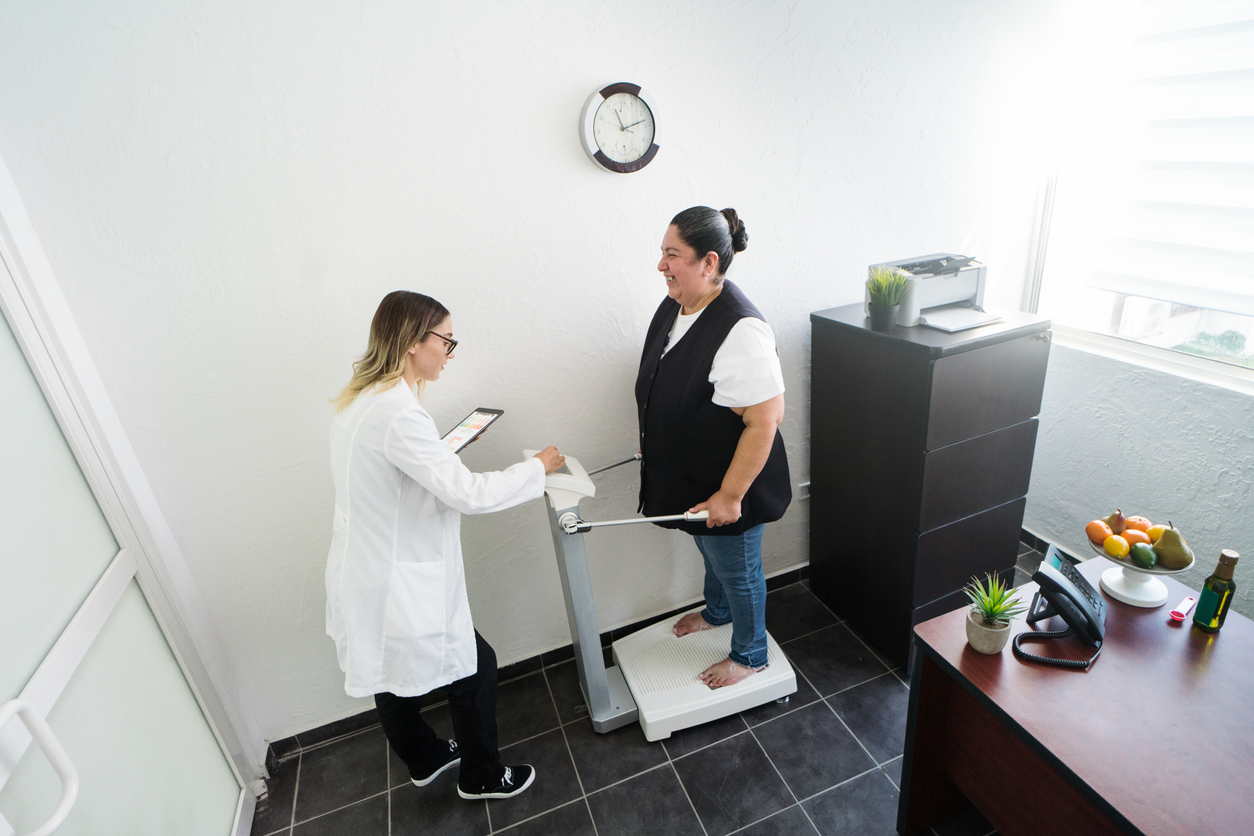
Types of Medical Scales
Medical scales find common use in healthcare facilities such as doctor's offices, clinics, and hospitals. Almost everyone is familiar with personal scales often seen in clinics or school nurse's offices. During health reviews conducted at various developmental stages, young children were traditionally weighed and measured on mechanical scales with sliders. The doctor would then record the results in the medical record book and plot them on a growth chart, which provides a visual representation of how the child compares to the broader population.
In modern times, electronic personal scales are more commonly employed for health reviews, as they can automate the weighing process for more precise and reliable results. This technological advancement eliminates the need for manual intervention by healthcare professionals and ensures accurate information regarding the individual's development.
Baby scales are probably the type of scales that most people imagine when they think of medical scales. In contemporary healthcare settings, medical baby scales have evolved to incorporate advanced technology, offering precise and efficient measurements. These modern scales often come equipped with user-friendly features, allowing healthcare professionals to monitor an infant's weight accurately and seamlessly, contributing to early detection of any potential health concerns. Monitoring an infant's weight is crucial, as inadequacies in this aspect can adversely affect the child's future. Both overly rapid and excessively slow weight gain in infants pose risks for various diseases and health issues, encompassing conditions such as childhood obesity and potential motor or psychological disorders.
Another commonly found variety of scales found within the health industry are medical chair scales and bed scales. Chair scales are used to measure the weight of patients in a seated position, particularly those who are incapable of standing independently, such as elderly or seriously ill individuals. These scales feature casters for swift and effortless transport. Equipped with brakes that secure the wheels, chair scales ensure that patients can sit and stand without the chair moving unintentionally. Additional benefits include a sturdy build and adjustable foot and hand rests. In contrast, bed scales are designed for weighing patients in a lying position, especially those undergoing treatments like dialysis or chemotherapy. Many models are suitable for older bed types and another tailored for professional beds with specialised patient positioning systems. Some of the more modern models are designed with measuring sensors beneath each wheel, which are able to deliver accurate readings for patients in a lying position.
Having the appropriate scale in a medical environment can streamline and enhance the process of weighing patients. Accurate measurement of a patient's weight is not only essential but mandated. Physicians and healthcare professionals frequently need to monitor changes in patient weight, making precision crucial, which stresses the importance of high quality and correctly calibrated medical scales.
Accuracy and Calibration
An imprecise weight reading can result in patients receiving either insufficient or excessive medication, leading to non-therapeutic or potentially harmful doses, which can lead to fatal complications for patient’s conditions like renal disease, certain cancers, or any patient with medications that are based on the patient's weight.
As such, regular checks and recalibrations should be implemented to maintain precision weighing, and to ensure that the scale delivers accurate and meaningful data, fostering confidence in its results.
Best Weight Scales for Your Hospital, Clinic, or Home
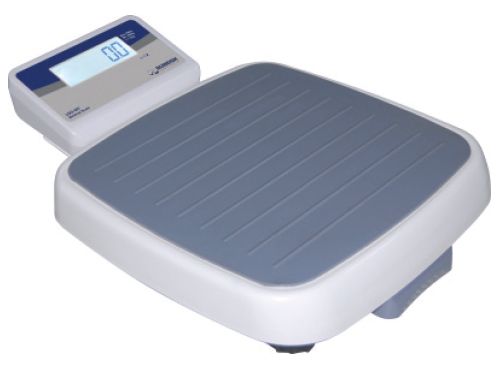
Nuweigh Heavy Duty Personal Scale (LOG907)
The Nuweigh Heavy Duty Personal Scale (LOG907) is a floor-style personal weigher crafted for use in high-traffic environments. Its robust and durable housing makes it well-suited for a variety of applications.
Features include:
- Long life rechargeable battery operation
- 250kg x 100g capacity
- Large 370mm x 370mm platform size
- Anti-slip mat
- Large 25mm LCD display
- EC approved for the medical industry
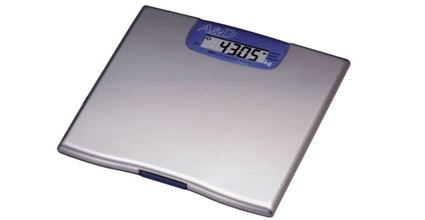
Low Profile Personal Weigher - A&D UC321
The Low Profile Personal Weigher - A&D UC321 is a personal weigher with high resolution, catering to both home and healthcare applications. As a personal weighing scale with high accuracy, it proves beneficial for athletes, fitness training, dialysis patients, weight management, and medical patient monitoring. Its precision and quality make it an excellent choice for home use as well.
Features include:
- Capacity of 150kg x 50g
- Ultra low profile makes the scale easy to step onto
- BMI calculation
- Memory storage
- Target weight setting
- Battery operation
- 1 year manufacturer’s warranty
Factors to Consider When Choosing the Best Fitness Scales
When choosing the right weighing scale for a healthcare facility or personal use, a thoughtful evaluation of the following factors is always recommended. Here are some key considerations to keep in mind…
Accuracy: The precision of the scales is paramount for monitoring the correct weight measurements of patients. Always opt for a set of scales that has a minimal margin of error in order to guarantee the highest level of accuracy.
Weight Capacity: It’s important to select a scale with a weight capacity that aligns with the requirements of patients, ensuring that the scale can accommodate a diverse range of individual’s weights.
Body Composition Measurements: Healthcare providers monitoring body composition, including metrics like body fat percentage or muscle mass, should prioritise scales that provide these measurements.
Backlight and Readability: Scales equipped with a backlight or easily readable display are recommended for environments with low light, facilitating convenient reading of weight measurements.
Ease of Use: Ideal scales for healthcare facilities are those that are easy to use, calibrate, and operate. Look for scales featuring straightforward controls and an intuitive interface.
Calibration: Regular calibration is crucial for maintaining accuracy over time. Select a scale that is easily calibrated to ensure consistent and precise measurements.
Brand and Reputation: It’s advised that you select a scale from a reputable brand that can boast a strong track record for quality and accuracy, which will always offer an additional layer of assurance.
By taking these aspects into consideration, healthcare providers can make a more informed choice when purchasing a set of weighing scales that correctly caters to the specific needs of their patients.
Conclusion
Whether in a clinical setting or a fitness facility, the use of precise medical scales is fundamental for promoting overall health and well-being. It is imperative that your medical scale ensures 100% accuracy. Selecting the right medical scale for your healthcare facility, weight loss clinic, paediatric office, or hospital is paramount for precise patient weighing.
Able Scale’s extensive range of medical scales caters for a wide range of applications, and we stock many models that are ideal for various medical facilities and hospitals. We also carry a wide range of scales suitable across a vast selection of sectors; from laboratory scales and industrial scales, to retail scales and label printing scales, Able Scales has it all. You can head over to the Able Scales website to browse our wide variety of high quality products, and if you need to get in touch with us directly, don’t hesitate to get in touch with us via the Able Scale’s Contact Us page. Easy!
Have questions about our products and services?
We are here to help. Please fill in our online enquiry form below, and we will respond to you within the next business day.



 Call us Today
Call us Today
